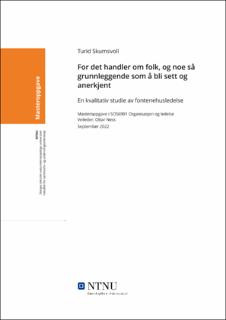| dc.contributor.advisor | Ness, Ottar | |
| dc.contributor.author | Skumsvoll, Turid. | |
| dc.date.accessioned | 2022-12-27T18:19:22Z | |
| dc.date.available | 2022-12-27T18:19:22Z | |
| dc.date.issued | 2022 | |
| dc.identifier | no.ntnu:inspera:118905027:53307349 | |
| dc.identifier.uri | https://hdl.handle.net/11250/3039597 | |
| dc.description.abstract | Mental helse anerkjennes på verdensbasis som en omfattende helseutfordring (WHO, 2022), og her i Norge rapporterer NAV at sykmeldinger på grunn av psykiske helseutfordringer står som nummer to på lista over årsaker til fravær i det norske arbeidslivet. KS poengterer at for å løse de komplekse samfunnsutfordringene det offentlige står overfor, må man benytte samhandling, medvirkning og innovasjon. Fontenehus representerer en modell for nettopp en slik samhandling og innovasjon. WHO anerkjenner modellen som fontenehus jobber etter som en modell for endring – som virker. Det er forsket lite på ledelse av fontenehus. Det er grunn til å tro at ledelse av en organisasjon med fravær av hierarkiske system kan være av betydning for andre organisasjoner, særlig innenfor offentlig sektor generelt, og arbeid med psykisk helse spesielt.
Denne kvalitative intervjustudien skal se på følgende problemstilling: «Hvordan beskriver daglige ledere av norske Fontenehus at de legger til rette for deltagelse, fellesskap og betydningsfullhet i organisasjonen?» Utvalget bestod av fem daglige ledere ved Fontenehus i Norge. Det ble gjennomført en tematisk analyse av det innsamlede datamaterialet som resulterte i fire tema: 1) Balansen mellom å gi og å ta ansvar, 2) Å spille aktivt på en flat organisasjonsstruktur, 3) Fellesskap og deltagelse som kilde til betydningsfullhet, og 4) Relasjonskompetanse som det viktigste verktøyet.
I lys av blant annet sentral innovasjonslitteratur, teori om relasjonell ledelse og betydningsfullhet diskuteres studiens fire hovedresultat. Det diskuteres hvordan det å jobbe aktivt for å la andre ta ansvar, ta beslutninger og drifte organisasjonen, og hvordan strukturer for nettopp denne fordelingen er viktig. Diskusjonen ser videre på hvordan relasjoner i organisasjoner står i sentrum for driften, og hvordan det legges til rette for deltagelse og fellesskap. Fontenehusene representerer en organisasjonsstruktur med fravær av makthierarki og strenge strukturer for hvem som bestemmer hva. Isteden er det en organisasjon der alle som driver den framover, styrer sin egen hverdag og tar på seg de arbeidsoppgavene de selv ønsker. Dette kan skape endringer ikke bare på individuelt nivå, men også på samfunnsnivå. Basert på resultatene argumenteres det for at den organisasjonsstrukturen som fontenehusene representerer, kan være en driver for sosial innovasjon. | |
| dc.description.abstract | Mental health is recognized worldwide as an extensive health challenge (WHO, 2022), and in Norway, NAV (Norwegian Labour and Welfare Administration) rapports that sick leave caused by psychiatric illness, is number two on the list of reasons for sick leave in the Norwegian working life. KS (The Norwegian Association of Local and Regional Authorities) points out that to solve the complex societal challenges the public system faces, we need cooperation, participation and innovation. Fountain houses (Clubhouses) represents a model for exactly this cooperation and innovation. WHO recognizes the model Clubhouses work by, as a model for change – that works. There seems to be little research on leading Clubhouses. There is reason to believe that leading an organization where there are no hierarchical systems, could be of importance for other organizations. Specifically within the public sector in general, and in mental health work in particular.
This qualitative interview study has examined the following research question: “How does Norwegian Clubhouse Directors describe how they facilitate participation, community and mattering in the organization?” The sample consisted of five directors of Norwegian clubhouses. The study conducted a thematic analysis of the collected data, that resulted in the following themes: 1) The balance between giving and taking responsibility, 2) Actively using the flat organizational structure, 3) Community and participation as a source of mattering, 4) Relational competence as the most important tool.
The four main themes are reviewed in light of central innovation literature, theory on relational leadership, and mattering. It is discussed how working actively on letting other take responsibility, make decisions and operate the organization, and how relationships in organizations are at the center of the operation, and how this facilitates participation and community. Fountain houses The absence of power hierarchy and strict structures for who decides what, but in stead an organization where everyone who runs it, also runs their own every day, and takes on the tasks they want. This can create changes on an individual level as well as on a societal level. Based on the results, it is argued that the organizational structure that the clubhouses represent, can be a instigator of social innovation. | |
| dc.language | nob | |
| dc.publisher | NTNU | |
| dc.title | For det handler om folk, og noe så grunnleggende som å bli sett og anerkjent. En kvalitativ studie av fontenehusledelse. | |
| dc.type | Master thesis | |
